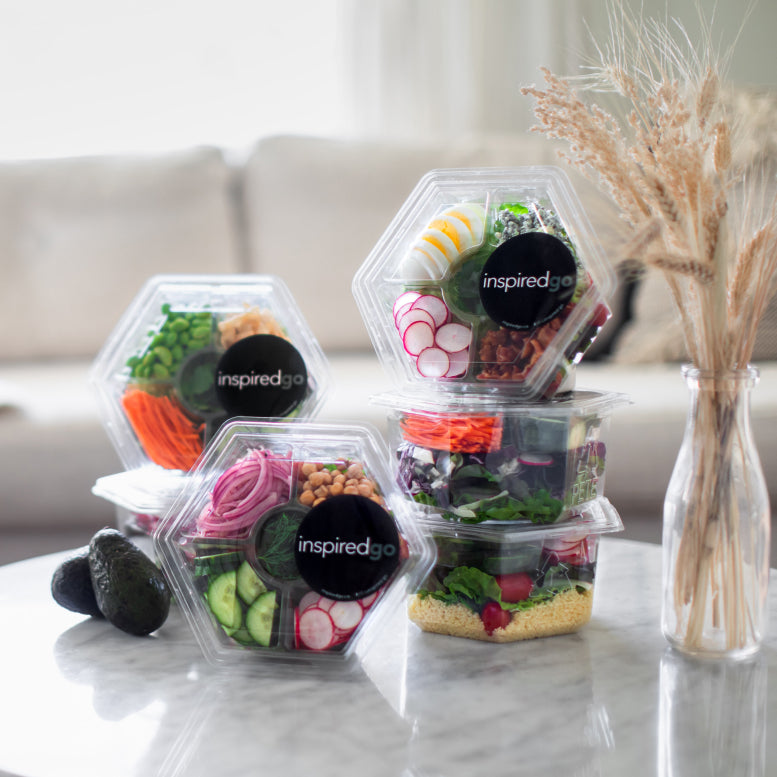Why Are Vegan Salads Considered Nutrient Dense?
Table of Contents
1. Nutrient Density in Vegan Salads
2. Are Vegan Salads Good for Weight Loss?
3. What Are Vegan Protein Sources for Salads?
4. What Sets Inspired Go’s Vegan Salads Apart from Other Options?
1. Nutrient Density in Vegan Salads
Vegan salads are widely recognized for their nutrient density, which essentially refers to the high concentration of essential vitamins, minerals, and other nutrients they provide per calorie. The foundation of vegan salads typically includes a variety of leafy greens such as spinach, kale, and romaine, known for their high content of vitamins A, C, K, and many B vitamins. Along with these greens, vegan salads often incorporate other vegetables, fruits, nuts, seeds, and legumes, each contributing different nutrients and health benefits. For instance, vegetables like bell peppers and tomatoes add a hefty dose of vitamin C and antioxidants, while avocados provide healthy fats and fiber. Legumes and seeds offer plant-based protein and iron, making vegan salads a balanced meal option. Moreover, due to the absence of processed foods and animal products, vegan salads are low in saturated fats and cholesterol, further contributing to their nutrient-dense profile.
Order fresh salads today →


2. Are Vegan Salads Good for Weight Loss?
Vegan salads are an excellent option for weight management because they offer nutrient-dense, low-calorie meals that keep you full and energized without adding excess fat or sugar. Rich in fiber, they help regulate appetite and promote feelings of satiety, reducing the likelihood of overeating throughout the day. The combination of leafy greens, colorful vegetables, and plant-based proteins ensures your body receives vital nutrients that support metabolism and fat-burning processes naturally. Ingredients like avocado, nuts, and seeds add healthy fats that make salads satisfying and balanced, avoiding the energy crashes common with restrictive diets. By focusing on unprocessed ingredients and portion-controlled servings, vegan salads make it easier to maintain a calorie deficit without feeling deprived.
Choose your salads and schedule delivery →
3. What Are Vegan Protein Sources for Salads?
Protein is an essential part of any balanced meal, and vegan salads offer plenty of plant-based options to meet your daily needs. Ingredients like chickpeas, lentils, quinoa, tofu, tempeh, and edamame are all excellent sources of high-quality protein, delivering the amino acids needed for muscle repair and sustained energy. Seeds and nuts, such as pumpkin seeds, almonds, and sunflower seeds, not only boost protein content but also add crunch and healthy fats to your meal. These proteins help keep you full for longer, making vegan salads a satisfying choice for lunch or dinner. When combined thoughtfully with fresh vegetables and whole grains, these plant-based proteins can provide a complete nutritional profile that supports active lifestyles and overall wellness, making vegan salads a reliable, nutrient-packed option for daily meals.
Get fresh salads and snacks delivered →
4. What Sets Inspired Go’s Vegan Salads Apart from Other Options?
Not all vegan salads are created equal, and Inspired Go takes plant-based meals to the next level with thoughtfully designed recipes and premium sourcing. We prioritize local, seasonal produce to maximize both flavor and nutrient density, pairing it with plant-based proteins, complex carbs, and healthy fats for truly balanced meals. Our salads are portion-controlled to help you stay on track with your nutrition goals, and every option is clearly labeled for transparency and peace of mind. Unlike quick-serve or store-bought salads that can feel repetitive or lacking in substance, Inspired Go’s dishes are chef-crafted for taste, texture, and long-lasting satisfaction. Each delivery brings you fresh, convenient meals that make vegan eating something you crave, not compromise on, giving you variety, flavor, and nutrition you can rely on day after day.
Try our fresh, ready-to-eat salads →
Frequently Asked Questions
The most nutritious salad greens are dark leafy varieties like spinach, kale, and arugula. These greens are packed with essential vitamins, including A, C, and K, as well as minerals like calcium and iron. Kale is particularly rich in antioxidants, while spinach offers significant amounts of folate and magnesium. Choosing a mix of dark greens enhances both the flavor and nutritional value of your salad.
A healthy salad includes a balance of nutrient-dense ingredients like leafy greens, fresh vegetables, lean proteins, and healthy fats. For example, a base of spinach and kale, paired with grilled chicken, cherry tomatoes, avocado, and a light olive oil dressing, creates a wholesome meal. Avoid fried toppings or sugary dressings, as they add empty calories, and opt for natural ingredients to maximize nutrition.
Yes, eating salad daily is a healthy habit when it includes a variety of fresh, nutrient-rich ingredients. Salads offer fiber for digestion, antioxidants for immunity, and essential nutrients like potassium and folate. Regularly eating salads can support weight management and improve energy levels. To avoid monotony, vary your greens, proteins, and toppings to keep meals satisfying and nutritionally balanced.
Healthy salad dressings are typically made with simple, natural ingredients. Olive oil-based dressings, paired with balsamic vinegar or fresh lemon juice, provide healthy fats and enhance flavor without unnecessary calories. Avoid store-bought dressings with high sugar or preservatives. For a creamy alternative, opt for homemade dressings using Greek yogurt or avocado for added nutritional benefits.
Yes, salads are incredibly beneficial for overall health when prepared with fresh, whole ingredients. They are low in calories and high in vitamins, minerals, and antioxidants, supporting heart health, digestion, and immunity. Adding a mix of proteins and healthy fats creates a satisfying, nutrient-dense meal. Regularly incorporating salads into your diet can promote long-term well-being and energy.

